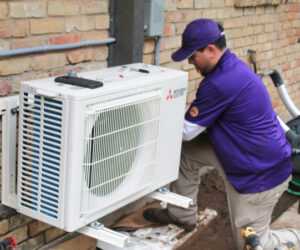
We live in a part of the country with historically long, hot summers. Home comfort is a vital part of life here, in the great state of Texas. Most homes in the DFW and surrounding areas rely on traditional heating and air conditioning systems: usually, centralized systems that heat or cool the air in a single location, then blow it through the home with a series of ducts. The system works quite well, but it’s not the only kind of HVAC system out there. Depending upon the needs of your home, another one might be able to do the job much more effectively. Ductless SystemsTraditional HVAC systems depend on ducts to carry the air through the home. But not every home can support such a system of ducts, especially older homes built before the advent of air conditioning. Ductless mini-split systems use multiple smaller units placed into your home at different points. Each unit is designed to heat or cool a specific section of the house. Each unit can be adjusted independently of the rest of the home as well. That lets you set different temperatures in different rooms to suit individual tastes. More importantly, it lets you turn the unit off in parts of the home you aren’t using while still running it in parts of the home you are. That can save you a great deal of money on heating and cooling bills, as well as eliminate the need for ducts to keep your home comfortable. Ductless mini-split systems are also becoming widely used in converted garages, home additions, sunrooms, man caves, she sheds, etc. Ductless Systems vs TraditionalCost: For a single-room solution, ductless units cost several times more than comparable window units (thousands of dollars versus hundreds). In whole-house terms, if you replace your existing central heating/cooling system with a complete ductless solution, the installed cost can be comparable to a traditional ducted system. However, a traditional ducted system costs thousands of dollars more to operate compared to a ductless over their lifetimes. Life expectancy: Both options have a life expectancy of 10 to 15 years. Beco Air and Heat ductless systems have a 12-year parts warranty. Geothermal SystemsMany homeowners have recently taken an interest in the trend of geothermal HVAC systems. It’s a technology that works similarly to traditional home heat pumps but depends on temperature differences deep underground rather than in the outside air. By drawing stored solar energy from the earth, geothermal systems are able to provide indoor comfort with noticeable savings and better efficiency, up to 48 SEER. Geothermal units are situated within the property, avoiding the need for outdoor air conditioning compressors that are generally exposed to harsh elements. Geothermal technology remains active at all times, whereas common HVAC systems usually cycle on and off in an attempt to regulate indoor temperatures. These systems rely exclusively on a renewable energy source and thus are often subject to tax credits that can save you money on installation. Monthly operating costs are generally much lower than older-fashioned technologies and tend to remain more consistent over the long haul. It all makes sense, then, that the Environmental Protection Agency has designated geothermal heating as an ideal green-friendly HVAC alternative. Geothermal Systems vs TraditionalCost: The installation price of a geothermal system can be several times that of an air-source system of the same heating and cooling capacity. However, the additional costs are returned to you in energy savings in 5 to 10 years. There are Government tax credits that can be applied to the total project up to 30%. This includes the equipment, ground loops, labor, and materials - the total job. Life Expectancy: There are notable advantages offered by geothermal energy in terms of performance. For starters, they’re expected to function for up to 25 years—considerably longer than the approximate 10-year lifespan of common HVAC systems. If you are interested in ductless or geothermal, give Beco Air & Heat a call! |


